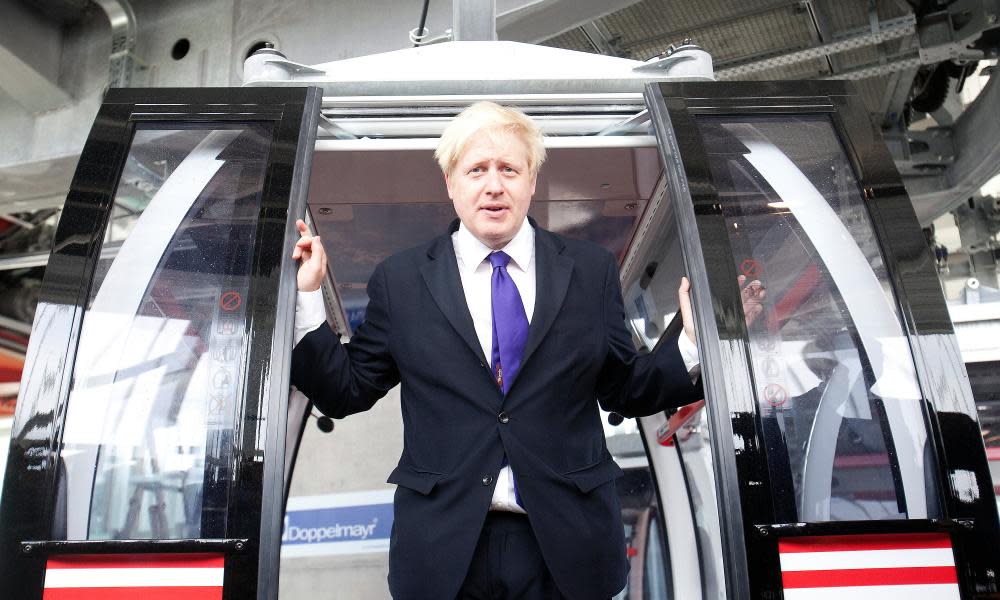Why did Boris Johnson blow £940m? Because the system let him | Hugh Muir

In any discussion of public profligacy and poor stewardship, one is obliged to consider the record of the foreign secretary Boris Johnson – for his two terms as London mayor appear to provide numerous examples of squander in search of grandeur. The garden bridge; the little-used cable car over the east of the Thames; the new Routemaster bus, for which no sound economic case was ever established; the derided ArcelorMittal Orbit fogging the skyline of London’s Olympic park. As the Guardian reported last week, a total of £940m was spent on his “vanity projects”.
Each debacle bears scrutiny, not just to know what has happened to public money, but also in the increasingly important context of Johnson as a senior member of a Brexit-bound government which promises, against all the evidence, that it has the financial nous and negotiating prowess to secure from Brussels the “best deal for Britain”.
Let me be clear: innovation and progress, in the private or public realm, involves cost and risk. Audacity in pursuit of the public good is to be encouraged. But audacity is not the same thing as recklessness. The garden bridge, the procurement path to which was condemned by an official report for its chumminess, shoddiness and lack of transparency was akin to a reckless, feckless father running off to the races with the family housekeeping.
Still, Johnson merely highlights a number of problems. He shows what happens when our celebrity culture, in which he has a starring role, fuses with an era of denuded press and desiccated politics. This is the age of the administrative monarch. We are encouraged to place power and trust in individuals of purported unparalleled wisdom, vision and probity. Mayors, metro mayors, police commissioners, superheads; we outsource to individuals, increasing their power in the belief they will get things done, unencumbered by faint hearts and red tape.
By this thinking, democratic checks and balances are a bother. There can, in this political calibration, be some light-touch monitoring, but the monarch must have all the power. True democracy can be such a millstone.
This is a philosophy tilted towards business in its many lucrative interactions with the public sector, for it sends a message that the special individual talents of the market do not need the democratic or collective checks and balances that might save us from folly. We saw this in the framing of the London mayoralty, where the initial hope was that a Richard Branson or a Greg Dyke would seize the sceptre. That didn’t work out. Instead of an industry titan, the befuddled lawmakers ended up with Ken Livingstone, the very antithesis of their hopes, and then Johnson.
But the thinking endures that true progress needs turbo-empowered individuals in whom we endow complete trust, as we might for a pilot or a brain surgeon, because their knowledge and drive and networking prowess surpasses our understanding. Theresa May sought that sort of unquestioning trust when she implored us not to worry our pretty little heads and to give her complete and personal authority to do as she pleased in Brussels. The country eventually called her out on that, but isn’t it time to question that philosophy everywhere?
Isn’t it time to reassess the extent to which we have loosened the regulatory structures? The Tory-led coalition scrapped the audit commission and with it a level of scrutiny that once gave the reckless pause. The Standards Board for England, responsible for monitoring ethical standards in local government, was doused in ministerial petrol and thrown on to the same so-called bonfire of the quangos.
At the same time, the right or expectation that local councillors, representing their communities, should sit on the boards of organisations in receipt of public funds – such as schools, housing associations and private firms delivering communal services – has been steadily eroded.
Our system is a largely a centralised one, but still the canny determined mayor can disengage the handbrake knowing that no one can, in real time, reapply it. Voters can assert their authority at some point on the journey, but it may be some way down the road. By that point the vehicle, recklessly driven, may have crashed. And by the time the authorities arrive, the driver may well have legged it.
So these leaders may never be held to account. Maybe they have already left office. The heat turns down, the world moves on. The protection of celebrity deflects the glare. Isn’t that what’s happened in the case of the garden bridge and all of the wasteful, ill-conceived Johnsonian follies?
Theresa May implored us not to worry our pretty little heads and give her authority to do as she pleased in Brussels
But isn’t it also – in terms of the public’s apparent inability to bring poor and reckless administrators to account – what’s happened in universities up and down the country? Vice-chancellors on grotesquely bloated salaries charge £9,000-plus tuition fees without any improvement in the offer to students. And in notorious academy schools, deified super-heads have taken advantage of huge pay cheques and light public supervision to provide pupils with a substandard education.
We have grown scornful of the mundanities of democracy. The celebrity-as-saviour populist version excites. But the dull, traditional, sometimes tortuous structures – with checks and balances and inquests and punishments – existed for a reason. With them grand projects took longer, consensus was required, and foolhardy stewardship carried risks. But without them we spend millions on the dream of a flowery bridge while services atrophy, food banks flourish, and the designers of that outrage move onwards and upwards.
• Hugh Muir is associate editor of Guardian Opinion

 Yahoo News
Yahoo News 
